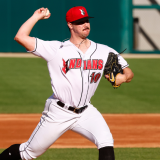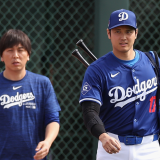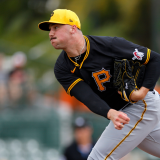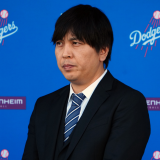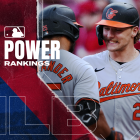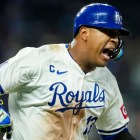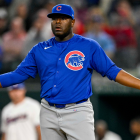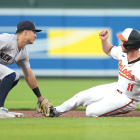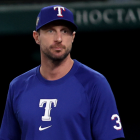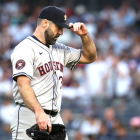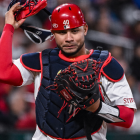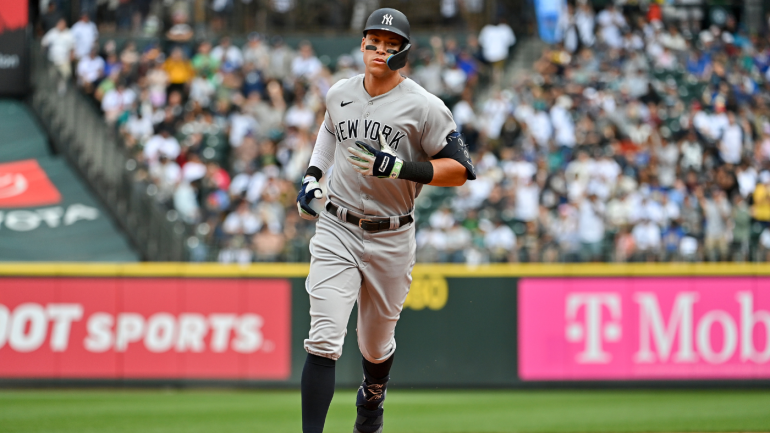
There is a chance, maybe even a great one, reigning AL MVP and No. 1 free agent Aaron Judge will sign a new contract at the Winter Meetings next week. The New York Yankees have made an offer "in the neighborhood" of eight years and $300 million, and are said to be willing to increase it. The San Francisco Giants, Judge's hometown-ish team, are also heavily involved.
The Giants and Yankees are the two primary suitors for Judge but they are not the only suitors. I would bet the farm on rumors of a Mystery Team™ being in the mix before it's all said and done, and you know what? Every so often the Mystery Team™ actually signs a premier free agent. It's happened before. Who's to say it won't happen again with Judge?
We are not here to play guessing games with mystery teams. We are here to look at five clubs that, as far as we know, are not involved in the Judge bidding, but would make sense as outside-the-box landing spots for the 62-homer man. Allow me to make the case for (and against) these five clubs swooping in to sign Judge.
Atlanta Braves
The case for signing Judge: Well, their World Series window is as open as it's going to get, and the Braves have their core locked up very affordably. Very, very affordably. They are perfectly positioned to spend huge on a star and ownership says it is ready to support a top-five payroll, so why not sign a top-five player? It's not an ideal positional fit (Ronald Acuña Jr. would have to slide over to left field, a position he hasn't played since 2019) but the outfield alignment isn't a dealbreaker. Think of the lineup potential:
- LF Ronald Acuña Jr.
- RF Aaron Judge
- 1B Matt Olson
- 3B Austin Riley
That's as good a 1-2-3-4 as you'll find in this game. Judge's contract could be structured in such a way that the highest paid years are at the beginning, before the big money years of Riley's, Spencer Strider's, and Michael Harris II's contracts kick in. It's a long shot, admittedly, but you needn't try to hard to see how Judge fits the 2021 World Series champs.
The case against signing Judge: The positional fit is not great and not just because Acuña would have to shift to left field. Dansby Swanson is a free agent and the Braves have a sizable hole at shortstop. If the Braves are going to give out a large free agent contract this offseason, it would make more sense to give it to a shortstop (Swanson or otherwise), which is the more pressing roster need. Judge is the best available free agent and there's a case to be made for just signing the best player, but positional fit does matter, and Judge isn't the best fit for Atlanta's roster.
Baltimore Orioles
The case for signing Judge: The Orioles just became the first team since the 1899 St. Louis Perfectos to post a winning record a year after losing 110 games. They are a team on the rise with a franchise player behind the plate in Adley Rutschman and arguably the best prospect in baseball in infielder Gunnar Henderson, who got his feet wet in September. There's a lot more coming up through the system too, including righty Grayson Rodriguez, one of the best pitching prospects in the game.
Also, the O's have no money on the books long-term. Zero. They don't have a single player under contract for 2024. They have a clean slate financially, so while they surely want to sign Henderson, Rodriguez and Rutschman to long-term extensions, they have the payroll space to do that and sign Judge. Similar to the Braves, the O's could frontload Judge's contract so that his highest paid years come while Henderson, Rodriguez, and Rutschman are at their cheapest, making life easier down the road.
You could argue it's a year too early for the O's to go after a top free agent. I would counter by pointing out the same was said when the Cubs signed Jon Lester. Anthony Santander socked 33 homers in 2022 and Austin Hays and Kyle Stowers are nice players, but those outfielders shouldn't stand in the way of signing Judge. The young core is emerging, there's no money on the books long-term, and a postseason spot is there for the taking in 2023. There is no better time to add a superstar free agent.
(As an added bonus, signing Judge would be a double whammy since the O's would add him to the roster and take him away from a division rival.)
The case against signing Judge: I firmly believe Baltimore should be aggressive this offseason and spend significantly an on elite, difference-making free agent. And if they're willing to do that, isn't Carlos Correa a better fit than Judge? Correa is three years younger and he has a history with GM Mike Elias (Elias drafted Correa when he was the Astros scouting director). There's some thought Henderson is a third baseman long-term, but even if not, sliding him to the hot corner to make room for Correa is reasonable. Alex Bregman is a natural shortstop who played third in deference to Correa. It can be done.
The Orioles have started to transition out of the rebuild and into contention, and part of that transition is spending on established MLB talent to supplement the young homegrown core. I won't make a case for the O's to not spend on a top free agent. I think they should. I will, however, make the case Correa is the more sensible target. He's several years younger than Judge and plays the more premium position. That is the case against signing Judge: sign Correa instead.
Chicago Cubs
The case for signing Judge: All signs point to the Cubs spending big this offseason. FanGraphs estimates their 2023 payroll at only $127.2 million, well south of the payrolls they ran during their most recent window of contention ($170 million to $203 million every year from 2016-20, before proration in 2020). Seiya Suzuki is the only long-term contract on the books and his contract is not onerous ($17 million per year average annual value).
Signing Judge would push Ian Happ back to center field and allow the front office to use top outfield prospects Kevin Alcantara, Alexander Canario, and Brennen Davis as trade chips (Canario suffered major ankle and shoulder injuries in a winter ball game in October, it should be noted). Everyone loves prospects, but the fact of the matter is not all of them will make it, and it is extremely unlikely any of them will be as good as Judge. Not a knock on them! It's just that Judge is a top five player in the world right now.
Bottom line, the Cubs are a big market team with designs on spending big this offseason, and that should make them a player for the reigning AL MVP and the free agent market's best option. This is the kind of guy you sign when you're touting payroll flexibility. The 2016 World Series winning core is pretty much gone. Only Kyle Hendricks remains and he was limited to 16 starts by arm trouble in 2022. The Cubbies need a new core and have a chance to build it around Judge.
The case against signing Judge: Similar to the Braves and Orioles, spending money on the infield would make more sense for the Cubs. They're set in the outfield corners with Happ and Suzuki (Happ is a year away from free agency but is a candidate to sign an extension) but have questions at second and third bases, and are said to be willing to slide Nico Hoerner over to second to make room for a big name shortstop. It's no secret the Cubs are expected to be a major player for Correa.
San Diego Padres
The case for signing Judge: Could you imagine? Padres GM A.J. Preller has never come across a big name he didn't want to acquire, and Judge is the biggest star of all right now. Left field is wide open as well, so the Padres could slide Juan Soto back over to left (where he's better defensively) and insert Judge into his familiar right field. Think of the top of the lineup:
- SS Fernando Tatis Jr.
- LF Juan Soto
- RF Aaron Judge
- 3B Manny Machado
Tatis will be eligible to return from his 80-game performance-enhancing drug suspension on April 20 and he could return as a center fielder, where his speed would be a weapon (and his propensity for errant throws would be less damaging). No matter where he plays, there's room for Tatis and Judge and Soto in the lineup. How could you pass that up?
There's also this: Machado can opt out of his contract after next season. He would walk away from five years and $150 million, and with another MVP caliber season in 2023, yeah, Machado very well could seek a larger payday. Sign Judge now and the Padres would ensure they have a) Judge and Machado in the lineup together for at least one season, and b) a power righty bat alongside Tatis to anchor the lineup in 2024 and beyond.
If the Padres are going to give an outfielder a big money long-term contract, I'm certain they would prefer to give it to Soto, who is seven years younger than Judge. Soto has already rejected a $440 million extension, however, and agent Scott Boras seems determined to take him into free agency and seek a record-smashing contract. Judge will come cheaper than Soto (but not cheap) and it's entirely possible San Diego will lose Machado after 2023 and Soto after 2024. Oof.
Also, signing Judge would open the door for a Soto trade. With Judge in the outfield, the Padres could more easily explore the trade market for Soto, and potentially recoup some of the young talent they traded away to get him. I'd keep Judge and Soto together as long as possible, but signing Judge does give Preller & Co. the option of moving Soto and replenishing the pipeline. There's no harm in kicking around the idea and seeing what's available, you know?
Ultimately, the Padres have never been more all-in than they are right now, and they went to the NLCS this past season. They want to get over the hump and win the franchise's first World Series soon (as in next year), and Judge would help the cause significantly. Depending what the Dodgers do this offseason, it's not completely crazy to think a Padres team with Judge and Tatis for most of the season could contend for a division title in 2023. Few executives go for it like Preller. Why not go for Judge too?
The case against signing Judge: FanGraphs estimates San Diego's 2023 payroll at $229.9 million, just under the $233 million competitive balance tax threshold. They seem destined to over the CBT threshold again next year, but signing Judge would require going way over, including over the $273 million penalty threshold that triggers increased tax rates and pushes the following year's first-round draft pick back 10 spots. At some point the Padres will reach their payroll limit, right?
Also, the Padres will have to rebuild most of their rotation next offseason, when Yu Darvish and Blake Snell become free agents. Joe Musgrove is signed long-term, so that's good, but various trades have cleaned out the farm system and they don't have much upper level pitching depth at the moment. There's Ryan Weathers, who allowed 101 runs in 123 Triple-A innings in 2022, and Jay Groome, and that's really it. There's a reason the Padres reached into the scrap heap to sign Julio Teherán recently.
That's a long way of saying the Padres have to be cognizant of their payroll and their ability to build a competitive pitching staff after 2023. Perhaps a Soto trade would bring young pitching, perhaps Machado leaves and they reallocate the money on arms, perhaps a few prospects surprise. It just seems like San Diego is already bumping up against their payroll limit and have a few too many other needs to address in the near future to give a soon-to-be 31-year-old outfielder a massive long-term deal.
Seattle Mariners
The case for signing Judge: The Mariners made the postseason for the first time in generation this past season and are all set up to enjoy their first extended period of contention since the days of Ken Griffey Jr. and Edgar Martinez. Even after importing Teoscar Hernández, there are massive holes in left field and at DH, and I'm not sure how much a team with World Series aspirations should count on Jesse Winker rebounding and Jarred Kelenic and/or Taylor Trammell finally figuring it out.
As for payroll, FanGraphs estimates Seattle at $141.0 million next season, which is a good $15 million or so south of their 2017-18 payrolls. You're a contender now, Mariners. It's time to up payroll and put your best foot forward, and adding Judge would solve a major need at the plate. Julio Rodríguez would remain the face of the franchise (everyone loves homegrown players) and he is already locked up to a long-term deal. The "we need to sign Julio" excuse does not apply. The need is there and the payroll space should be there too. The Mariners are in prime position to add a big name star and it gets no bigger than Judge.
The case against signing Judge: The Mariners already have a few strikeout prone hitters in their lineup in Hernandez, Cal Raleigh, and Eugenio Suárez (and Rodríguez, though his strikeout rate improved as his rookie season progressed). Judge has improved his contact rates to league average, though he's a big guy with a big strike zone who will always strike out more than the average hitter. Adding another strikeout prone hitter to the lineup would be suboptimal. Other than that, I got nothing. Seattle has the need for an impact outfielder and the financial wherewithal to make it happen.









